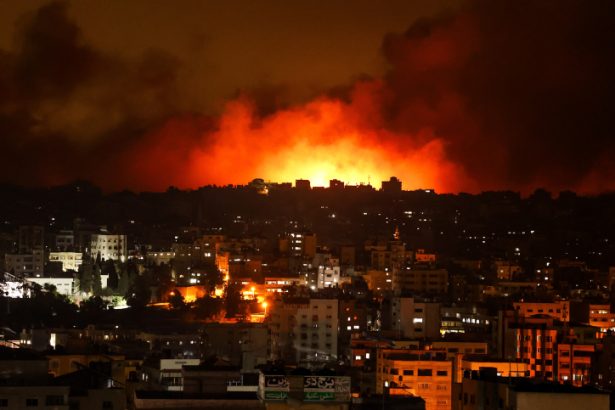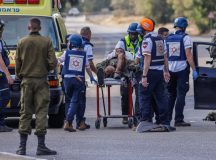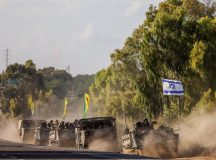In a briefing, Maj. Gen. (ret.) Giora Eiland, former head of the Israeli National Security Council, Strategic Planning Branch of the IDF, emphasises the existential importance of Hamas being militarily destroyed. He argues that the only ways to achieve this strategic goal is either an extended and dangerous ground invasion – which he deems too costly – or a total siege of Gaza to bring Hamas to its knees ‘the more humanitarian approach compared to other scenarios.’ (Editorial Note: The call for a ‘total siege of Gaza’ in this article expresses theview of the author, not the Fathom editors. In direct response to that call, published in the same issue, Fathom editor Alan Johnson and then deputy editor Jack Omer-Jackaman co-wrote ‘For the total defeat of Hamas, Against the total siege of Gaza’, in which we made the editors’ own view clear: ‘Such a siege is … wrong on three counts: wrong in principle, wrong for building international alliances, and wrong in terms of the battle for global public opinion.’)
The event that took place on October 7 is undoubtedly the most dramatic experience that the State of Israel has ever faced. Even the 1948 War of Independence or the 1973 Yom Kippur War did not cause as dramatic a shift as we are in right now.
It was a terrible massacre of 1200 civilians which included pregnant women, children and holocaust survivors – many of whom were burned alive – plus approximately 200 Israeli hostages most of whom are civilians and some of whom are babies (including one of 4 months) who are now being held hostage in Gaza by Hamas and Islamic Jihad.
The dramatic event creates a real existential threat.
Not because Hamas poses such a threat to Israel today, but because if we don’t manage to permanently remove this threat, it will be impossible to live in Israel. If we want to persuade those who lived in those 22 destroyed communities in which hundreds were murdered to rebuild their villages and bring up their children there, the State of Israel should guarantee that what happened can never happen again.
To translate this into a strategic goal, the decision by the Israeli government – to create a situation in which Hamas no longer exists as a military threat, or maybe even not as a political practical entity in Gaza for many years – is actually the only possible decision.
Yet this goal is also very ambitious. It’s one the Government didn’t decide on during the last 17 years (despite the various cycles of violence), because it understood that achieving it was so far reaching, we might have to take some drastic measures that we never took before.
There are two options Israel can take to achieve this goal, which is also the minimum expected from a country that wants to survive.
Option 1: Large scale military operation on the ground
The first is to carry out a massive large scale ground operation, to stay in Gaza with many forces in order to clear any building and tunnel in which Hamas is hiding – and there are thousands of kilometres of tunnels with 20,000 Hamas fighters hiding below the ground. The problem won’t be the first phase, but rather staying there for weeks and months. The cost on the Israeli side will be very high. And Gaza isn’t our only problem – Hezbollah is still considering whether to try and achieve Iran’s dream of a simultaneous attack on two fronts, which the Islamic Republic doesn’t feel Israel can defend itself against.
As a military expert, I believe that there is no careful way Israel can destroy and kill 20,000 Hamas fighters hiding in hundreds of kilometers of tunnels. IDF soldiers will need to enter the tunnels to find them. If Israel decides to carry out such a large invasion it will be done via cover of artillery and airstrikes which will lead to many civilians killed – not because we want it, but because there is no distinction as to the location where the combatants are and where the civilians are. Hamas has infrastructure under every civilian facility and there is no way we can clear thousands of kilometres in Gaza – it has never been in the history of wars.
Israel is not going to send thousands of soldiers to risk their lives in order to maneuver within the tunnels (and at a time when Hezbollah could attack from the north).
Option 2: Total siege on Gaza
I believe that the only effective way to achieve that strategic goal is to impose a dramatic, continuous, and strict siege over Gaza. This is what Israel has begun to do – we cut the supply of energy, water and diesel to the Strip. During the last 17 years, maybe we were naïve enough, good enough, stupid enough, humane enough, that we supplied Gaza will all these materials and allowed thousands of Palestinians to enter daily into Israel to work and bring food to their children.
That will not be repeated. But it’s not enough.
In order to make the siege effective, we have to prevent others from giving assistance to Gaza. Israel sent a clear message that even if they want to sell containers with diesel and other energy we will not let it happen and if needed we will bomb these containers.
People might ask whether we want the people of Gaza to starve. We do not. Therefore, the people of Gaza will have to leave – either temporarily or permanently – via the border with Egypt. When the people have evacuated, and the only ones left in Gaza are Hamas, and when food water has run out – and we can also bomb the water facilities in Gaza so there will be no water – then at some point Hamas will either be completely destroyed or surrender or agree to evacuate Gaza just as Arafat was forced to leave Beirut after an Israeli siege.
Any other measure short of this will not be effective.
Israel should not allow any economic assistance. The people should be told that they have two choices; to stay and to starve, or to leave. If Egypt and other countries prefer that these people will perish in Gaza, this is their choice. I prefer something that is more reasonable.
Within 2 hours Israel could destroy all the water facilities in Gaza. We will not do it today because there are 2 million people there. But we will do it a minute after they leave when the only ones remaining are Hamas. We can be patient, similar to sieges all over history when they last weeks, months and years until the other side possess no ability to function. I hope someone will convince the leadership to surrender earlier. But if there is no other choice, that’s what we should do.
Israeli leaders compare Hamas to ISIS – and we are speaking about people who do the same thing and have a similar ideology. In a sense, Hamas’ behaviour is similar to that of the Nazis – where during World War 2 they prioritised murdering as many Jews as they could even if it undermined their ability to continue the fighting.
It’s also clear that, contrary to Al Qaeda and ISIS, Hamas is not some group of terrorists who came from nowhere. It was elected in democratic elections in 2006 (perhaps the most democratic elections that have taken place in the Arab world) and was supported by 70-80% of people in Gaza (similar to the number of Germans who supported Hitler.). And the people of Gaza continued to support Hamas. All the funds the international community and other countries send to the people of Gaza is taken by Hamas leaders to build military force while people continue to suffer – but in some ways the people identify with the jihadist ideology (just as many Germans supported the extreme ideology of Hitler in the 1930s and 40s.)
I’m not looking for revenge or retaliation but to enable Israel to continue to exist. And that requires Hamas to disappear as a political or military force in Gaza forever. The above option is the only way I know that such a goal can be achieved. That’s why I support implementing such a closure and siege, and the Arab countries should be calling for Egypt to open the passage and let the people of Gaza leave. This is something I expect the international community to support if not to understand.
When the British and Americans fought Hitler and Japan
During World War 2, the Brits didn’t hesitate to try and kill as many German civilians because they understood that it was part of the military effort to remove evil. The Americans did much more than that after Pearl Harbor. When the Japanese decided they didn’t want to surrender, two atomic bombs were dropped. At some point a nation needs to decide whether it is us or them.
Contrary to the British and the Americans in WW2, I’m not suggesting killing these people. I prefer to have these people be alive and survive but only by moving to Egypt. And if they don’t they will starve not because of the Israeli bombs but because there will be no water in Gaza.
I’m not punishing the people of Gaza. Hamas behaved like ISIS but they grew in Gaza with the full support of the people of Gaza; 70-80% of people supported them even if they knew their ideology. People have to be accountable for decisions that they make (such as in Germany)
This siege can be stopped or interrupted if someone – such as Erdoğan or Arab countries who support Hamas – will persuade the Hamas leadership that in order to prevent such a terrible result to their people, they, the government of Gaza has to surrender, just as the government of Japan ultimately decided to surrender. If there are forces that have some kind of influence on the leadership of Hamas – which is travelling between Qatar and Ankara – who can persuade them to surrender, then we will be more than happy. But we cannot stop before we see something dramatic changes.
The Day After
I’m not saying that Israel should completely destroy the Gaza Strip. The international community can establish another regime in Gaza (perhaps even along the lines of what happened in Germany after the Second World War.) After the enemy was defeated there was an opposite approach by the victors and we’ll be more than happy to advance such a thing. The Palestinian Authority is not strong enough on its own to come to Gaza. It will need assistance from Arab countries such as Egypt, Qatar, UAE and Saudi Arabia and others to give it the financial package to rebuild what has been destroyed.
Again, this is not about retaliation or revenge. This is a calculated professional analysis of the situation and I have to compare between two possible terrible scenarios. I can’t see anything better than that. This is the more humanitarian approach compared to other scenarios.
A ground operation can create some kind of partial destruction of abilities of Hamas. Maybe it can deter the leadership to not repeat what it did for a few years. But that’s not good enough. If we do it, we may sacrifice hundreds or thousands of young Israelis. Why should we do this when there are other alternatives? We are in a different ball game – it’s a dramatic change. It’s a new turning point in the history of the State of Israel. Most people don’t understand that.




































